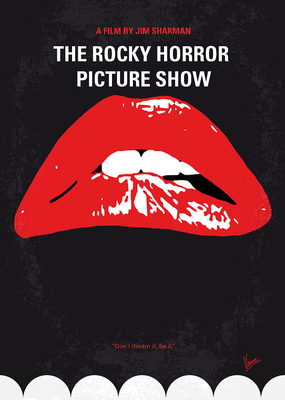Sometimes our dreams aren’t meant to be realized, especially if it means corrupting or hurting others. The only thing separating us from the animals is our ability to control our instincts. The Rocky Horror Picture Show tells us that it’s okay to use pleasures to escape our pain and troubles, no matter what the cost. This is the same reasoning that sex addicts and alcoholics use prior to getting help. In this film, that way of thinking is encouraged.
Beginning with the engagement of naïve milquetoasts Brad (Barry Bostwick) and Janet (Susan Sarandon), the story sends its two leads to a world of sin and sodomy that erroneously treats instinctual repellence as a form of judgement.
They stumble upon Frank N. Furter’s (Tim Curry in drag) dark castle—repurposed sets from Hammer horror movies—and are seduced and brainwashed into subverting norms that they’ve only ever ostensibly believed in. Because anyone with real, grounded morals and philosophies wouldn’t be so easily swayed.
This type of transgressive teaching will only affect those who are just as lost as Brad and Janet, two souls who aren’t astray because of their unwillingness to “try new things,” but because the lifestyle they previously belonged to was practiced without any real prudent deliberation. It was merely that of blind, misunderstood tradition. You should be fervent in your beliefs, otherwise, why have them? By joining the likes of Frank N. Furter, they are no more ardent than they were before, but simply have found something easier to subscribe to because of the pleasureful benefits.
Frank winds up raping both victims, which is played for laughs, and convinces them to join him—which they do. This antagonist (who eventually becomes the protagonist?) plays the role of the media, luring in the pure and untouched by praying on their curiosity, exploiting it until they lose their inhibitions and become corrupted in the name of pleasure. It’s hedonism under the guise of innocuity, intentionally blurring the line between immoral and harmless—not to set others free, but as a form of social engineering.
Everything about Curry’s character feels predatorial, as if he could only win over Brad and Janet because of their weaknesses. And yet, his behavior is applauded by the most diehard fans of the film who celebrate the same kind of stuff that ruins marriages and, in extreme cases, embraces cultures of rape and abuse.
These fans are so hesitant to make Frank a psychopath, confused with how to frame his villainous behavior. The film is proof that gender fluidity does in fact require some level of indoctrination and brainwashing. Queers should be offended by the insinuation that Curry’s character is a psychopath just like they’re offended every other time this occurs in film. But because the story also lauds sexual promiscuity and free love, he gets a pass?
In theory, I should be glad this movie exists so that people can see how toxic and evil this kind of behavior is. But alas, people are so misguided themselves that they view Rocky Horror Picture Show as a champion for their own immorality and have retooled it to conveniently justify their own actions.
More of a pop culture curio than it is an actual coherent narrative, The Rocky Horror Picture Show features an unjustified and jarring switch in protagonists towards the end of the second act. Also, there’s too much music in this musical, with only two songs that are really worth listening to. The only enjoyable aspect is the production design.


1 Comment